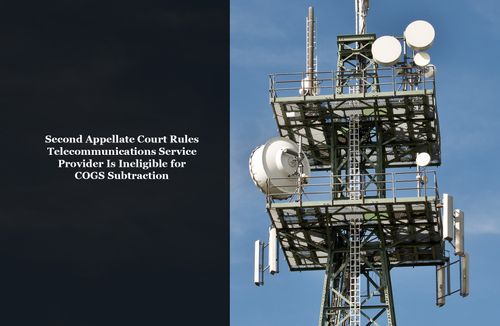On August 21, 2019, the Texarkana Court of Appeals ruled that a telecommunication service provider, Metropolitan Telecommunications (“MetTel”), is not entitled to calculate its franchise tax margin using the cost of goods sold (“COGS”) subtraction. See Metropolitan Telecomms. Holding Co. v. Hegar. This holding is consistent with the Austin Court of Appeals’ opinion in NTS Communications, Inc. v. Hegar.
The Comptroller audited MetTel and disallowed the company’s COGS subtraction, claiming that MetTel was not eligible for the subtraction because it did not sell tangible personal property—i.e., goods. Rather, the Comptroller contended, MetTel was a service provider not entitled to COGS.
In its suit challenging the Comptroller’s assessment, MetTel argued that it did, in fact, sell tangible personal property because the digital light, electrical, and radio frequency signals that it produces for its customers are perceptible to the senses and, therefore, within the statutory definition of tangible personal property. MetTel also tried to distinguish itself from service providers on two grounds. First, MetTel argued that it did not provide a service because its signals were created through an automated process, and not through employee labor. Second, MetTel argued that it was not a service provider because it did not own—but rather leased—the infrastructure used to make its signals available to customers.
The court summarily rejected MetTel’s arguments, relying upon the Austin Court of Appeals “well-reasoned statutory construction analysis” in NTS Communications, Inc. v. Hegar, which held that another telecommunications service provider was not eligible for COGS. The MetTel court further held that, even if MetTel were eligible to subtract COGS because it sold goods, the costs that MetTel sought to subtract—the cost of leasing the infrastructure used to push its signals—would be statutorily disallowed as outbound transportation costs to deliver the product.
MetTel is expected to appeal the ruling to the Supreme Court of Texas. However, given the Supreme Court’s denial of review in NTS, it seems unlikely that the court will take the case. Nonetheless, similarly-situated taxpayers claiming COGS because they sell tangible personal property that is “perceptible to the senses” may find reprieve in the Texas Supreme Court’s forthcoming decision in Hegar v. American Multi-Cinema (“AMC”). In AMC, the Comptroller is asking the high court to consider whether exhibiting films to the public for a fee constitutes the sale of tangible personal property because it is perceptible to the senses. The Texas Supreme Court will hear oral argument in the case on October 9, 2019.

